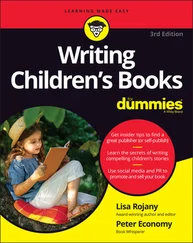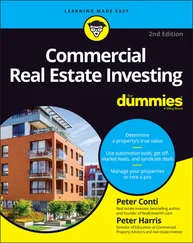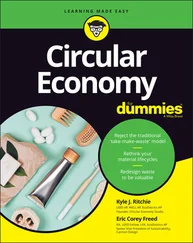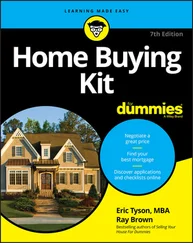The lender next assesses your qualification on the basis of your credit report, liquid assets (cash, stock, or other easily accessible forms of money), and your debt-to-income ratio (the amount of debt you carry in the form of loans and credit card balances versus your income). Your lender’s approach to these issues is very similar to how it will underwrite your construction loan (see Chapter 10for the specifics). To make its decision, the lender wants to see, at minimum, the following documentation:
Appraisal
Credit report
Three months’ bank statements
Two years’ W-2s and recent pay stub
Two years’ tax returns, if self-employed
Lenders may loan you a higher percentage of the purchase price based upon the quality of your other qualifications. Being able to show good credit and sufficient income might get you a loan for up to 80 percent of the purchase price.
 Many lot lenders are the same lenders that finance construction. You apply for a construction loan some months after you get the land. If the lender sees conflicting information regarding income or assets, the lender can turn you down. Therefore, understanding the requirements for lot loans and construction loans is critically important. (We explain construction loan requirements extensively in Chapter 10.) Lenders look in their files for any other loans they made to the same borrower. If the information is inconsistent, the lender simply rejects the loan.
Many lot lenders are the same lenders that finance construction. You apply for a construction loan some months after you get the land. If the lender sees conflicting information regarding income or assets, the lender can turn you down. Therefore, understanding the requirements for lot loans and construction loans is critically important. (We explain construction loan requirements extensively in Chapter 10.) Lenders look in their files for any other loans they made to the same borrower. If the information is inconsistent, the lender simply rejects the loan.
 One of the advantages of working with a mortgage broker is that they can act as a filter. By looking at your documentation, a good broker can determine which lender fits best with your project. Doing so keeps you from stabbing in the dark and providing too much information to the lender that may result in denial.
One of the advantages of working with a mortgage broker is that they can act as a filter. By looking at your documentation, a good broker can determine which lender fits best with your project. Doing so keeps you from stabbing in the dark and providing too much information to the lender that may result in denial.
The most important criterion for your loan is the loan’s length of time. (We talk more about timing of lot loans in the section “ Making sure the loan period is long enough,” later in this chapter.) Generally, your lot loan picks you based upon your qualifications. You may, however, need to choose between a fixed-rate loan or an adjustable-rate loan. Some lenders offer only fixed-rate loans where the interest rate stays the same for the loan’s life. These rates are generally higher than adjustable-rate mortgages, which have interest rates that move with a particular monetary index such as government treasury bills.
Some people believe a fixed rate can save you money because it protects you from rising interest rates. But if you plan on building in the next few years, you’ll be taking a construction loan that pays off the land loan (see Chapter 9for details). Because you’ll likely pay off the land loan soon with the construction loan, using a fixed-rate loan isn’t likely to save you much money. Ultimately, you need to do the math and compare the various loan payment options over the length of time you anticipate before you start building.
 Kevin’s recommendation is to always go with the largest amount of money you can borrow for the longest period of time with the lowest payment. Doing so gives you the most flexibility for moving into construction financing by keeping the maximum amount of cash in your pocket where you need it most.
Kevin’s recommendation is to always go with the largest amount of money you can borrow for the longest period of time with the lowest payment. Doing so gives you the most flexibility for moving into construction financing by keeping the maximum amount of cash in your pocket where you need it most.
Getting denied: What the banks won’t finance
We can think of several situations that will eliminate conventional financing as an option to buy a lot. Some are based upon your own situation and some on the property. Here’s a quick checklist:
If your credit score is below 640 (see Chapter 10)
If you’ve been late on your mortgage in the last 12 months
If you’re unemployed
If you have no down payment
If the property has existing buildings on it
If the property is more than 50 acres (some banks allow only 20 acres)
If the property has no electricity nearby
If the property has no public access
If the property has multiple parcels (some banks allow two)
If your property or qualifications fall into one of these categories, don’t panic just yet. Other lending alternatives are available. Some may cost more money and be more restrictive than conventional lending, but they may be better than the thought of abandoning your project.
Finding other land loan alternatives
If you find the perfect lot and the bank thinks the property or your credit and income are less than perfect, you still may be able to buy it without paying all cash. Some lending alternatives are available if your property or credit doesn’t meet the bank’s guidelines.
Letting the owner carry the burden
One alternative way to finance a property is to have the property owner loan you the money or carryback paper. In this case, the seller acts as the lender and has you (the buyer) execute a note secured by the property for the amount he doesn’t receive in cash through escrow. Not every owner will consider this option. If the owner carries back the entire amount of the purchase price, the seller can’t owe any money on the property. Another way a seller can help is to carry back a second loan so that you can put down a smaller down payment. The primary lender must agree to this arrangement. In either case, the seller has the ability to foreclose if you miss payments. You need your real-estate agent or an attorney to draft the note and security instrument to make sure everyone is properly protected.
When is a seller more willing to carry the financing themselves? A seller may agree to carry paper if the property is hard to finance through banks or if they — for whatever reason — are anxious to sell. The seller may also want to defer the taxes due from the sale of the property; carrying paper allows the seller to pay taxes only as you pay off the loan. You gain no real advantage when the seller carries the financing unless the loan’s terms are more favorable than any other lender offers you. Most construction lenders require the seller to be paid off when they fund the construction loan. Few institutional construction lenders allow a subordination of a seller carry.
 Some sellers want a premium if they’re going to carry paper. Furthermore, many sellers still want to check your financial wherewithal, so credit and income can still factor into their decision. Ultimately, you can negotiate the best deal with a seller if they’re getting all the money expected from the escrow, so having the seller carry may not be the best route.
Some sellers want a premium if they’re going to carry paper. Furthermore, many sellers still want to check your financial wherewithal, so credit and income can still factor into their decision. Ultimately, you can negotiate the best deal with a seller if they’re getting all the money expected from the escrow, so having the seller carry may not be the best route.
Using private or hard money
Hard money comes from private investors who specialize in making loans on real estate. Hard-money lenders generally aren’t concerned with credit or income. They hope to make high-interest yields or make money by taking back your property through foreclosure and selling it at a profit. Typical hard money runs a number of percentage points higher interest than the prevailing market rate, plus 5 percent of the loan amount in upfront fees, called points. This high interest seems expensive, but if banks or owners won’t give you a loan, then this choice may be better than not buying the lot at all. Because hard-money lenders like equity, they usually want as much as a 50 percent down payment.
Читать дальше
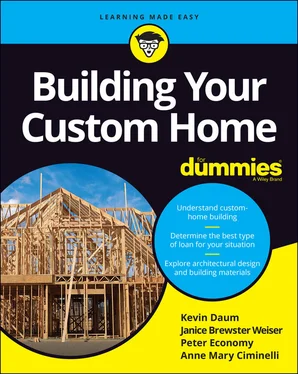
 Many lot lenders are the same lenders that finance construction. You apply for a construction loan some months after you get the land. If the lender sees conflicting information regarding income or assets, the lender can turn you down. Therefore, understanding the requirements for lot loans and construction loans is critically important. (We explain construction loan requirements extensively in Chapter 10.) Lenders look in their files for any other loans they made to the same borrower. If the information is inconsistent, the lender simply rejects the loan.
Many lot lenders are the same lenders that finance construction. You apply for a construction loan some months after you get the land. If the lender sees conflicting information regarding income or assets, the lender can turn you down. Therefore, understanding the requirements for lot loans and construction loans is critically important. (We explain construction loan requirements extensively in Chapter 10.) Lenders look in their files for any other loans they made to the same borrower. If the information is inconsistent, the lender simply rejects the loan. One of the advantages of working with a mortgage broker is that they can act as a filter. By looking at your documentation, a good broker can determine which lender fits best with your project. Doing so keeps you from stabbing in the dark and providing too much information to the lender that may result in denial.
One of the advantages of working with a mortgage broker is that they can act as a filter. By looking at your documentation, a good broker can determine which lender fits best with your project. Doing so keeps you from stabbing in the dark and providing too much information to the lender that may result in denial.